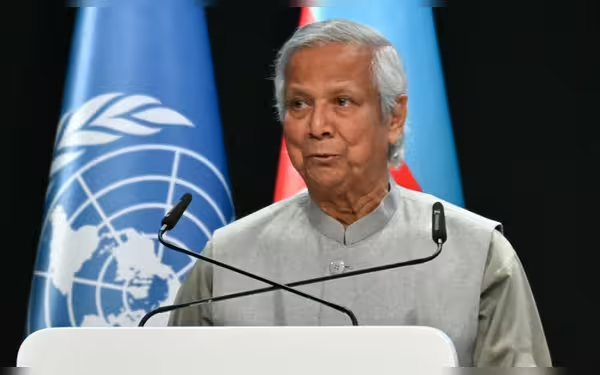Wednesday, January 15, 2025 11:02 AM
Yunus Calls for Patience in Bangladesh After 100 Days in Power
- Yunus emphasizes need for patience from citizens.
- Election commission formation is a priority.
- Justice sought for violent crackdown on protests.
 Image Credits: brecorder
Image Credits: brecorderMuhammad Yunus urges patience as he marks 100 days in power, focusing on elections and justice for protest violence.
In a significant moment for Bangladesh, interim leader Muhammad Yunus has called for the nation’s "patience" as he marks 100 days in power. This period follows a student-led revolution that ended the long-standing rule of Sheikh Hasina, who had been in power for 15 years. Yunus, an 84-year-old Nobel Peace Prize laureate and a pioneer in microfinance, was appointed as the "chief advisor" on August 9, shortly after the uprising. His administration is tasked with the challenging job of restoring democratic institutions in a country of approximately 170 million people.
During a recent speech, Yunus emphasized the importance of forming an election commission "within a few days". However, he refrained from providing a specific timeline for the elections, stating that this would depend on necessary election and constitutional reforms. He assured the public, saying, "I promise that we will hold the much-anticipated election once the necessary and essential reforms are complete." Yunus further requested the citizens to be patient, expressing a vision to create an electoral system that would last for decades.
In addition to focusing on elections, Yunus's administration is committed to ensuring justice for those responsible for the violent crackdown on protests that led to Hasina's ousting. He mentioned that he had been in contact with Karim Khan, the chief prosecutor of the International Criminal Court, regarding the situation. Notably, an arrest warrant has been issued for Hasina, who was last seen fleeing to India as protests escalated. She has been summoned to appear in court in Dhaka to face serious charges, including "massacres, killings, and crimes against humanity." Meanwhile, several of her former ministers, who were detained, are also expected to face similar charges.
Analysts have described the challenges facing Yunus as "monumental." Thomas Kean from Crisis Group has warned that "cracks are emerging in the fragile alliance" that brought Yunus to power. While there is currently widespread support for his administration, the expectations of the public are high and could become a double-edged sword. If the interim government fails to implement reforms, it could lead to an early election with little progress, or in a worst-case scenario, a military takeover.
As Bangladesh navigates this critical juncture, the call for patience from Yunus reflects the complexities of governance in a nation striving for stability and democracy. The coming days will be crucial as the interim administration works to fulfill its promises and restore faith in the electoral process. The eyes of the nation, and indeed the world, will be watching closely to see if Yunus can deliver on his commitments and lead Bangladesh towards a brighter future.













